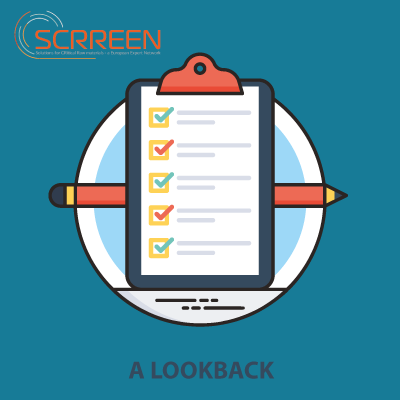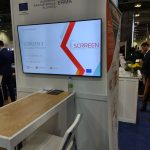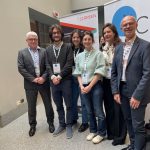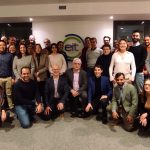SCRREEN organised three clustering events during the lifetime of the project, see their short descriptions below:
The first clustering workshop took place in parallel with the project’s first round of Expert Group meetings on Resources and Policy, 30 – 31 May 2017, Brussels. 16 projects were invited, of which 9 attended the event. All projects had 10 minutes to introduce their project in a plenary session. This way, all projects were updated about other projects on the topic of critical raw materials in order to be able to find common ground, synergies and possibilities for collaboration. Instead of roundtables that were planned in order to discuss ways to increase the impact of those projects, a questionnaire was distributed amongst clustering participants in order to gather concrete proposals for collaboration between projects.
The second clustering workshop took place in parallel with the project’s third round of Expert Group meetings on Circular Economy, Substitution and Resources, 10 – 11 July 2018, Rome. Eight project coordinators (CRM Recovery, SCALE, PC-REC, REE4EU, CHROMIC, NOI EXTREME, SusCritMat, COLLECTORS) and EIT Raw Materials presented their activities on CRM in the context of Circular Economy. The event organized under the umbrella of SCRREEN’s clustering work-package allowed project coordinators to exchange on project activities, objectives and challenges.
All projects had 12 minutes to introduce their project in a plenary session. This way, all projects were updated about other projects on the topic of critical raw materials in order to be able to find common ground, synergies and possibilities for collaboration. Instead of the roundtables that were planned in order to discuss ways to increase the impact of those projects, a questionnaire was distributed amongst clustering participants in order to gather concrete proposals for collaboration between projects. The discussions around the projects aimed at identifying possible means of collaboration and cross-fertilization in order to avoid duplication of work and optimize project’s resources. The audience of the event was given the opportunity to share own experiences and knowledge with project coordinators, making this event both participative and integrative. As outcomes of the discussions, possible means of collaboration have been identified, i.e. in the form of co-organization of events around projects’ common interest. In order to enhance the mapping of possible collaborations a questionnaire was handed out to project coordinators for them to further contribute to the ideation of clustering activities in the future.
Read more about The Expert Group workshop that took place in parallel here.
The third clustering workshop took place on 12 November 2018 in Brussels, in combination with the second Annual Critical Raw Materials (CRMs) Event. This event offered an opportunity to a variety of stakeholders to get a fresh update about the latest EU activities in the field of Critical Raw Materials. The event was co-organized with the European Commission, and together with the EU projects CROCODILE, NEMO, DEMETER, REE4EU, COLLECTORS, ECO COM’BAT, EXTREME, INTMET, GLOREIA, SCALE, SLIM and SusCritMat. The event took place during the Raw Materials Week 2018.
The event was opened by Gwenole Cozigou from the Commission’s DG GROW and Peter Buchholz from DERA, who outlined the Importance of critical raw materials and future demand and supply. Key and future technologies are massively driving future demand for mineral raw materials, especially considering the energy transition.
The first session was a panel presentation and discussion on CRMs in specific value chains. Ms Blagoeva (JRC) presented the research on Critical raw materials in strategic value chains, in which the value chains for PV & Wind energy, energy grids and batteries (e-mobility, robotics and defence) were analyzed on raw materials, processed materials, components and systems.
The next session was a panel discussion on Applications, Environmental & Industrial Challenges: How to Improve Public Perception of the CRMs? The panel was chaired by Guillaume Pitron, expert journailist in CRM. It was also accompanied by a consultation of the session’s audience via SLI.DO around the questions addressed by the invited panellists. The last session focused on current R&D&I projects on CRM in Europe. The following projects presented their work: SCRREEN: deploying new value chains: voluntary standards, policies and regulatory framework – Mr Stéphane Bourg and Mr Guenter Tiess (MINPOL); CROCODILE project – Mr Nader Akil (PNO); NEMO – Mr Lieven Machiels (KU Leuven); RE4EU – Ms Ana Maria Martinez (SINTEF); Substitution and CRM: results of the SCRREEN Substitution Expert Group reflexions on selected sectors (Ms Susanne Coles (KTN); Training and Education: DEMETER – Ms Gwendolyn Bailey (KU Leuven).
Comments are closed.





 The SCRREEN3 project has received funding from the European Union's Horizon Europe Research and Innovation Programme under Grant Agreement N° 101138060
The SCRREEN3 project has received funding from the European Union's Horizon Europe Research and Innovation Programme under Grant Agreement N° 101138060